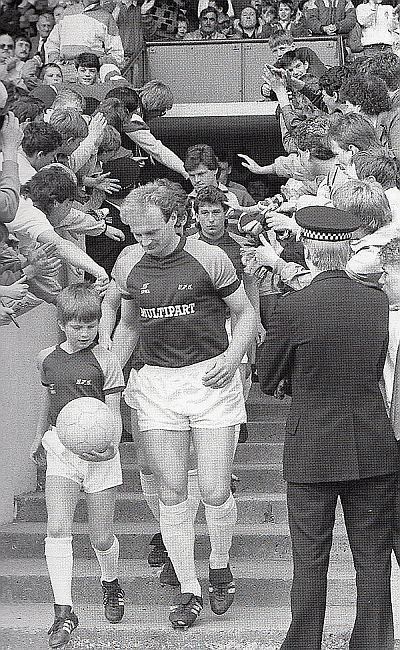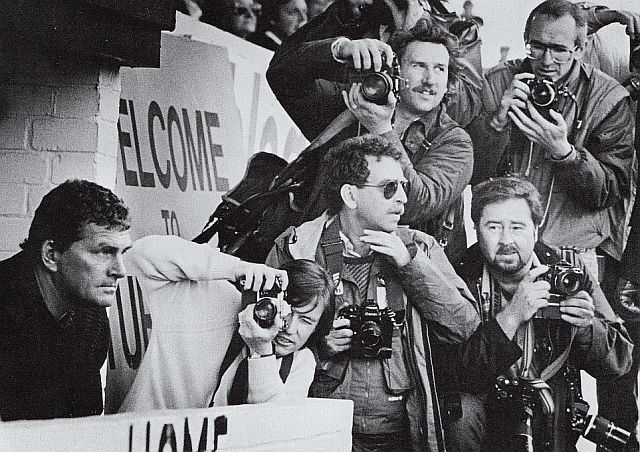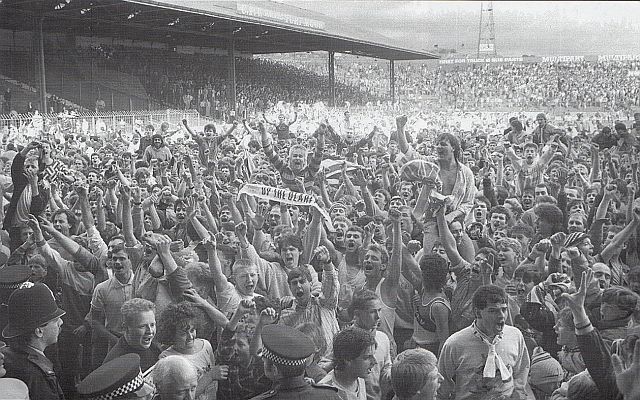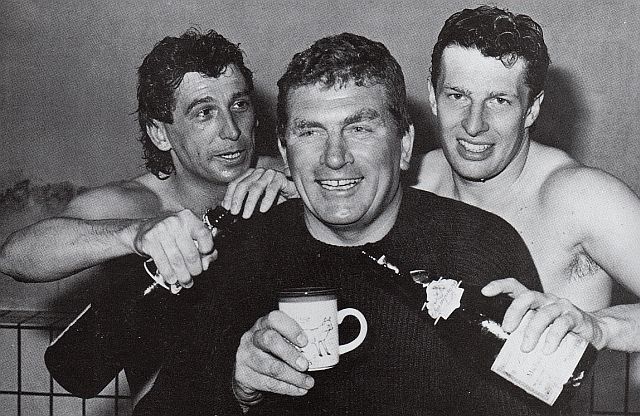Below are four of the reports that arrived on the door mats on Sunday 10th May 1987 as Ian Woolridge, Mike Langley, Derek Wallis and Rob Hughes told the story of Burnley's escape.
In Living Memory
Ian Woolridge
 They came to bury Burnley and stayed to sing their praise
They came to bury Burnley and stayed to sing their praise
We gathered like predatory undertakers and professional mourners, lured by the death throes of a stricken giant.
Reporters who'd forgotten where Burnley was spilled our over the press seats, which had gathered the dust of disinterest. Some had their obituaries already written.
There was coruscating criticism of the club that became too big for its boots, posthumous debunking of Bob Lord, the small-town butcher who'd built himself a grandiose memorial, and there was lyrical lament for one of the twelve founder clubs of English, and thus world football.
We noted that the sun shone down on the old dying cotton town with ironic brilliance. We recalled that for years it had the highest suicide rate in Britain. We looked at the beautifully appointed ground with a pitch barely scarred by the end of the season and agreed how sad it was.
We'd done our homework too, Burnley, founded 1888 as a League Club; the smallest town in Britain to sustain a First Division team for years on end; the first club in England to establish a training ground elsewhere to work on brilliant tactical moves; the club which had a crowd of 49,734 in 1914 and a record gate of 54,775 for a cup game against Huddersfield in 1924.
Now, poverty-stricken on attendances of fewer than 3,000 they were about to fall through the floor of the Fourth Division. They had to beat the Orient and rely on matches elsewhere. It wasn't going to happen so let's get it over with and catch the 5:47 back to London.
But it was of course, the day that Burnley made fools of the ghouls.
The script started going wrong when Burnley and Orient came out for the 3 p.m. kick off and were immediately shooed off again by the police.
Thousands were still outside the ground clamouring to get in, yell their encouragement and join in the singing of “You'll Never Walk Alone”.
Burnley would never have been in this plight had they not been abandoned to walk alone several seasons ago but their players were too panic stricken for cynicism when they finally kicked off in front of 15,781 spectators. They were playing for their own careers, let alone Burnley's survival, and the sporting term “sudden death” takes on new shades of meaning when the last pay cheque is only 90 minutes away.
I shall never quite determine who won the match; the Burnley team or the crowd. The Burnley team were fuelled by 45% talent – which means they played above themselves – and 180% adrenalin. The crowd, in this recently echoing concrete mausoleum at the foot of a damp Lancashire valley, was as passionate, pro rata, as I have ever heard.
They came from everywhere. Cliff Knights, who left Burnley in 1960 to become a prosperous chartered engineer in Bristol, had driven up that morning with his wife, Betty, for what he considered would be a wake. John Ratcliffe, who cut his teeth on Burnley football until he went to London University and started teaching geography in Catford, spent £100 simply to go back on the terraces and roar.
There were hundreds in the crowd on similar pilgrimages back home, thousands who had actually stirred themselves from TV just down the road now that Armageddon was near.
They were immaculately behaved, as were the visiting Orient fans from London, and I have to report that if I could see matches of such passion and intensity even three times a season I would cease being one of soccer's missing millions tomorrow.
It was a classic sporting occasion, if not a classic exhibition of football, superbly refereed and ferociously contested by an Orient team themselves in contention for promotion.
The roar that greeted the goal that put Burnley 2-0 up was probably heard in Blackpool. The silence that met Orient's goal was such that many couldn't believe it was scored until play restarted in the centre circle.
A draw was no good to Burnley. So began the 35 minutes that were to determine whether Burnley died, aged 99, without so much as a formal telegram from the Queen. The spectator immediately in front of me, a local businessman with a tartan scarf wrapped into an extremely expensive mackintosh had assured me earlier that if Burnley lost the match, Burnley, as a town, would die. Hyperbole to the visiting undertakers, but in his case a personal understatement.
I thought he was going to have a heart attack every time Orient fired a shot at goal during those leaden minutes to survival. He turned round and almost strangled me when it was over.
Burnley made it at the expense of Lincoln City, The recriminations of lunchtime were forgotten in teatime euphoria.
But have the lessons been learned? Did Burnley really deserve to live? Is reprieve merely the prelude to more complacency? And is “You'll Never Walk Alone” the anthem of ultimate hypocrisy?
The answers, I suppose, are that if you want a League football club locally, go and support it. Burnley did, with only a few minutes to spare.
It's Cruel
Mike Langley
 Roll on the day when Liverpool meet Arsenal to avoid being ousted from the League by the likes of Kidderminster Harriers.
Roll on the day when Liverpool meet Arsenal to avoid being ousted from the League by the likes of Kidderminster Harriers.
For only then will the authorities understand the folly of the cruel ordeal to which Burnley were subjected before beating Orient 2-1 to stay in the Fourth Division.
The snare intended for perennial lame dogs like Rochdale and Torquay nearly throttled instead a League founder member at the start of the centenary season.
Now it's Lincoln City who go out, replaced by Scarborough from the GM Vauxhall Conference.
It's crazy. The big clubs should be enlarging the Fourth Division, not chucking long-serving clubs out of it.
They'll think of this at Burnley tomorrow and throughout the close season when the outburst of delight has died down.
Fans choked the streets and all but trebled the best gates of the season to nearly 16,000. They perched on the fences, hugged and kissed each other at every goal, flooded the pitch with dancing bodies at the final whistle, did a conga round the mounted police squad; and didn't forget Orient's small band of supporters.
Clog dancers in the market square began Burnley's big day, almost a wake but, in the end sunny enough for a carnival.
Bob Lord said in 1977: “Clubs like Burnley are on the road to ruin. They cannot compete with the big cities.”
So poor butcher Bob, Burnley's tyrannical chairman for 26 years, was not turning in his grave yesterday. Gloating, more likely, over so nearly seeing his words come true.
For Orient were the sounder, more threatening side and looked set to add Burnley to Tranmere and Torquay in a hat-trick of wins against strugglers.
Burnley, especially their defence when dealing with crosses, played on the edge of hysteria.
But Grewcock steadied them down and set the stadium – still one of the best in the league – jumping with joy with a shot from the right edge of the box just before half time.
Grewcock's free kick early in the second half was headed in by Britton and Burnley – the fans, if not the team – decided they were safe.
But then Comfort scored for Orient with a left-foot volley when Neenan missed a cross on the challenge from Orient's outstanding captain Cornwell.
Only a minute earlier Godfrey's header had been turned round Neenan's post and a little later Cornwell had two shots blocked in Burnley's goal mouth.
But Burnley can also point to the goal Britton missed in the 64th minute and the shot that Grewcock fired against a post near the end.
Manager Brian Miller, 50 years old and a Turf Moor man for more than 30 years, said: “This must never happen again. In 1982 we had six boys who would have been cornerstones of the team for 10 years but within two years they had all gone.
“We've sold more players than we should have done, and some of them didn't want to leave.
“See that stand? We sold Ralph Coates and Martin Dobson to pay for that. But clubs are not about stands. They are about what happens on the park. We must build, and build a team now.”
They may never again win a European match 3-0 against Naples, as they did 20 years ago. But neither should they or any other Fourth Division side be put through this torture in the last of the 46 matches.
Burnley Survive
Derek Wallace
 The tension was unbearable and the atmosphere unbelievable at Turf Moor, which usually houses no more than 3,000, on the day when 15,781 watched Burnley preserve their Football League Status at the eleventh hour.
The tension was unbearable and the atmosphere unbelievable at Turf Moor, which usually houses no more than 3,000, on the day when 15,781 watched Burnley preserve their Football League Status at the eleventh hour.
It seemed as if the whole town had turned up, and the team responded with a stirring performance when it mattered most.
Heart attacks were in order when Orient reduced a hard won two goal lead and threatened more than once to equalise, but Burnley, having removed both feet and at least one arm from the grave of Non-League football, refused to submit again and clung, at times precariously, to their precious lead, and with it their standing as a League club.
At the final whistle hundreds ran onto the pitch, as much in relief as celebration, and refused to leave until the team returned to share the moment of dubious glory with them.
Nest Saturday's FA Cup Final may produce a match of greater quality, but it is questionable whether it will be more dramatic or emotional than this game.
The programme seller I encountered before the match had sold out. At his age it was hardly likely to have happened to him before, with people, not all of them intending to be spectators, buying fistfuls as potentially profitable mementoes should the worst have happened.
Thousands more than usual, however, poured through the turnstiles, and the press box was crammed too, as Fleet Street and its Wapping suburb arrived to chronicle the most crucial match in Burnley's history. With hundreds more spectators queuing outside, the kick off was delayed by 15 minutes, thus prolonging the anxiety for all concerned.
Having survived Orient's initial attacks, in which Leebrook cleared from beneath the bar from Howard, Burnley, encouraged by such unaccustomed support, strode forward purposefully. But they had to wait until a minute before half time to score the first priceless goal.
Grewcock scored it, striking the ball unerringly beyond Cass after a run that took him wide of two half-hearted challenges, and the crowd responded with a roar that suggested it was more of a promotion winner than a life saver.
The second half had barely started before Burnley scored again. To the crowd's delight Grewcock's cross from the right was met by Britton, who made the most of a moment of freedom to leave Cass stranded.
At the other end Neenan prevented Godfrey from scoring with an acrobatic save, but he was powerless when the ball reached Comfort from Brooks on the right. Comfort reacted with a shot of quality that reduced Burnley's lead and many in the crowd to near tears as the tension mounted yet again.
Orient, whose own designs on a promotion play-off place were wrecked by the result, forced Burnley to live on their nerves towards the end, with Godfrey striking a post before the final whistle mercifully put an end to a dramatic afternoon.
Salvation for Burnley
Rob Hughes
 Burnley Football Club is still a member of the oldest Football League in the world. In a desperate, scrambling match before 15,781 fans yesterday they survived for the narrowest of victories.
Burnley Football Club is still a member of the oldest Football League in the world. In a desperate, scrambling match before 15,781 fans yesterday they survived for the narrowest of victories.
When the news came through that Lincoln had lost at Swansea, a massive contingent of supporters, young and old, invaded the pitch, endangering players such as Leighton James, who, under the sheer emotional burden they had carried, were slumped on their knees in the centre circle.
Why do grown men become so moved by an apparently trivial sport? If you need to ask you have no conception of the traditions by which this famous club helped to forge a competition which spread football in its known form around the world.
It was not morbid curiosity that brought them all to Turf Moor. It was the dilemma of either seeing a dramatic, last gasp escape from oblivion or paying last respects to a truly great club which 99 years ago had been a founder member of the League, and which in the 60's had actually, with great class and culture, ruled as champions and had taken on and beaten the finest in Europe.
And it was a club which had produced, from schoolboys, enough great individuals to supply the major clubs of our League with talent.
The feeling that we were at a wake lasted almost throughout a first half which had been delayed 15 minutes because so many thousands of claret and blue supporters, completely out of the habit, were still pouring into the ground after 3 o'clock.
Once George Courtney, the World Cup referee, had signalled action he was desperately trying to control tackles which came in far too late from men whose skill quota could hardly live with the ghosts of the club created by the late Bob Lord.
In the first minute Leebrook bailed out his goalkeeper, by heading from beneath the crossbar a looping header from Howard. And in the 38thminute Burnley needed an extra ally, the right hand post, when Deakin attempted in sheer panic to prevent Godfrey from scoring.
Yet either side of half time, Burnley rescued their status. In time added on for some gruesome first half fouls, little Neil Grewcock, an import from Leicester, came in from the right wing, jinked across the edge of the box past two lunging tackles and his left foot shot could only be parried inside the far post by Cass.
No sooner had the game restarted than Ian Britton, fighting as hard as he did in his Chelsea heyday, found himself with time and room to spare eight yards from the Orient goal and he made no mistake with a firmly headed second goal. With the news that Torquay and Lincoln were both two goals down, Burnley had a lifeline.
What Burnley had rescued from the grave they now fought perversely to imperil. Only a few seconds after going two up, goalkeeper Neenan was exposed to an almost point-blank header from Godfrey. Miraculously he clung on.
Then in the 56th minute Burnley left Alan Comfort in an acre of space and from Shaun Brook's centre, he was able to score with ease with his left foot. Burnley were back on the rack. We all, traditionalists and romantics, suffered again until that final whistle.
